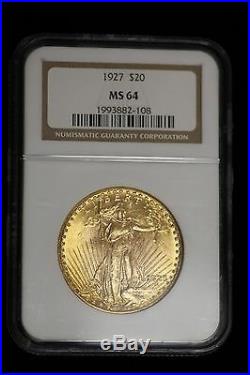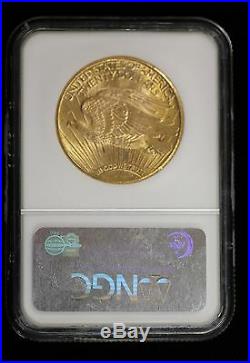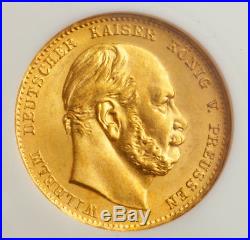
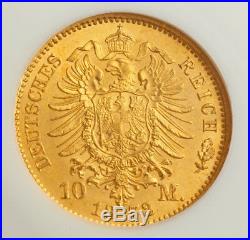
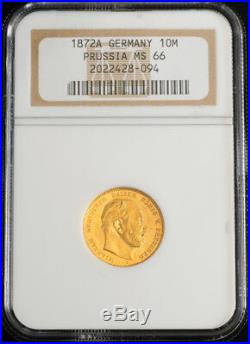
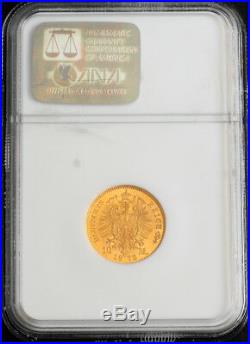

1872, Prussia, Wilhelm I “the Great”. Gold 10 Mark Coin. Mint Year: 1872 Mint Place: Berlin (A) Reference: Friedberg 3819, KM-502. Certified and graded by NGC as MS-66! 900 Diameter: 20mm Weight: 3.98gm. Obverse: Head of Wilhelm I “the Great” right. Legend: WILHELM DEUTSCHER KAISER KÖNIG V. Reverse: German crown above heraldic eagle with shield witha arms of the Kingdom of Prussia at chest. Legend: DEUTSCHES REICH (oak-twig) 10 – M. Wilhelm I, also known as Wilhelm the Great[citation needed] (William Frederick Louis, German: Wilhelm Friedrich Ludwig) (March 22, 1797 March 9, 1888) of the House of Hohenzollern was the King of Prussia (January 2, 1861 9 March, 1888) and the first German Emperor (18 January 1871 9 March, 1888). Under the leadership of Wilhelm and his prime minister Otto von Bismarck, Prussia achieved the unification of Germany and the establishment of the German Empire. On January 2, 1861 Frederick William died and Wilhelm ascended the throne as Wilhelm I of Prussia. He inherited a conflict between Frederick William and the liberal parliament. He was considered a politically neutral person as he intervened less in politics than his brother. William nevertheless found a conservative solution for the conflict: he appointed Otto von Bismarck to the office of Prime Minister. According to the Prussian constitution, the Prime Minister was responsible solely to the king, not to parliament. Bismarck liked to see his work relationship with Wilhelm as that of a vassal to his feudal superior. Nonetheless it was Bismarck who effectively directed the politics, interior as well as foreign; on several occasions he gained Wilhelm’s assent by threatening to resign. In the aftermath of the Franco-Prussian War Wilhelm was proclaimed German Emperor on January 18, 1871 in Versailles Palace. The title “German Emperor” was carefully chosen by Bismarck after discussion until (and after) the day of the proclamation. Wilhelm accepted this title grudgingly as he would have preferred “Emperor of Germany” which, however, was unacceptable to the federated monarchs, and would also have signalled a claim to lands outside of his reign Austria, Switzerland, Luxemburg etc. The title “Emperor of the Germans”, as proposed in 1848, was ruled out as he considered himself chosen “by the grace of God”, not by the people as in a democratic republic. This Empire was a federal state; the emperor was head of state and president (primus inter pares – first among equals) of the federated monarchs (the kings of Bavaria, Württemberg, Saxony, the grand dukes of Baden, Mecklenburg, Hesse, as well as other principalities, duchies and the senates of the free cities of Hamburg, Lübeck and Bremen). On May 11, 1878, Max Hödel failed in an assassination attempt on Wilhelm in Berlin. A second attempt was made on June 2, 1878, by the anarchist Karl Nobiling, who wounded Wilhelm before committing suicide. These attempts became the pretext for the institution of the Anti-Socialist Law, which was introduced by Bismarck’s government with the support of a majority in the Reichstag in October 18, 1878, for the purpose of fighting the socialist and working-class movement. The laws deprived the Social Democratic Party of Germany of its legal status; they prohibited all organizations, workers’ mass organizations and the socialist and workers’ press, decreed confiscation of socialist literature, and subjected Social-Democrats to reprisals. The laws were extended every 2-3 years. Despite this policy of reprisals the Social Democratic Party increased its influence among the masses. Under pressure of the mass working-class movement the laws were repealed on October 1, 1890. In his memoirs, Bismarck describes Wilhelm as an old-fashioned, courteous, infallibly polite gentleman and a genuine Prussian officer, whose good common sense was occasionally undermined by “female influences”. The item “1872, Prussia, Wilhelm I the Great. Gold 10 Mark Coin. (3.98gm!) NGC MS-66″ is in sale since Monday, November 19, 2018. This item is in the category “Coins & Paper Money\Coins\ World\Europe\Germany\German States (up to 1871)”. The seller is “coinworldtv” and is located in Europe. This item can be shipped worldwide.
- Certification Number: 2022428-094
- Certification: NGC
- Denomination: 10 Mark
- Grade: MS66
- Composition: Gold
- Year: 1872


